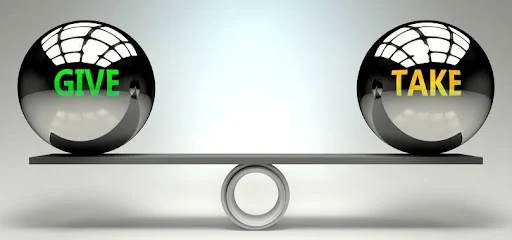“Selfishness is not living as one wishes to live, it is asking others to live as one wishes to live.” - Oscar Wilde
What do you think of this quote? Do you agree or disagree with it? Do you think that selfishness is a good or a bad thing? And do you think that you are selfish or not?
Delving into this concept through Social exchange theory, which is a theory that proposes that human interactions are based on the exchange of rewards and punishments. Rewards are anything that we value, such as money, praise, love, or happiness. Punishments are anything that we dislike, such as pain, criticism, rejection, or guilt. According to social exchange theory, we are motivated to maximize our rewards and minimize our punishments in our social relationships.
Social exchange theory assumes that we are rational actors who weigh the costs and benefits of our actions. Costs are the negative consequences of our actions, such as time, effort, money, or risk. Benefits are the positive outcomes of our actions, such as satisfaction, pleasure, gratitude, or recognition. We compare the costs and benefits of different alternatives, and choose the one that gives us the highest net benefit. This is called the comparison level.
Social exchange theory also assumes that we have expectations about the rewards and punishments that we deserve in our relationships. These expectations are based on our past experiences, social norms, and personal values. We compare the actual rewards and punishments that we receive in our relationships with our expectations. This is called the comparison level for alternatives. If the actual rewards and punishments are higher than our expectations, we are satisfied with our relationships. If they are lower than our expectations, we are dissatisfied with our relationships.
HOW ARE WE ALL SELFISH?
According to social exchange theory, we are all selfish because we always seek to maximize our rewards and minimize our punishments in our social interactions. We do not do things for free, but rather expect something in return. This something can be tangible, such as money, goods, or services, or intangible, such as respect, appreciation, or affection. We are constantly evaluating the costs and benefits of our actions, and comparing them with our expectations and alternatives.
For example, when we help a friend, we may expect them to help us back in the future, or to thank us, or to like us more. When we donate to a charity, we may expect to receive a tax deduction, or a certificate, or a good feeling. When we volunteer for a cause, we may expect to gain new skills, or to meet new people, or to enhance our reputation. When we buy a gift for someone, we may expect them to reciprocate, or to be happy, or to appreciate us more.
These examples show that we are not truly altruistic, generous, or compassionate, but rather selfish, calculative, and instrumental. We do not help others for their sake, but for our own sake. We do not give without expecting to receive. We do not act without considering the consequences.
HOW DOES THIS AFFECT OUR LIVES?
Being selfish is not necessarily a bad thing. In fact, it can be beneficial for our survival, well-being, and happiness. Being selfish can motivate us to work hard, to achieve our goals, to pursue our interests, and to take care of ourselves. Being selfish can also help us to form and maintain mutually beneficial relationships with others, based on trust, reciprocity, and cooperation.
However, being selfish can also have negative consequences for our lives. Being selfish can make us greedy, stingy, or manipulative. Being selfish can make us ignore the needs, feelings, or rights of others. Being selfish can make us exploit, cheat, or harm others. Being selfish can also damage our relationships with others, based on distrust, resentment, or conflict.
Therefore, being selfish is a double-edged sword. It can be good or bad, depending on how we use it, and how we balance it with other values, such as fairness, justice, or empathy. Being selfish is not a fixed trait, but a flexible choice. We can choose to be more or less selfish, depending on the situation, the person, and the outcome.
To conclude, we are all selfish, and nothing is truly free. We always do things for a reason, and that reason is usually to benefit ourselves. We always expect something in return, and that something is usually to satisfy our needs, wants, or desires. We always weigh the costs and benefits of our actions, and compare them with our expectations and alternatives.
This does not mean that we are evil, immoral, or inhuman. It just means that we are rational, realistic, and human. It also does not mean that we cannot be altruistic, generous, or compassionate. It just means that we are not always so, and that we have to be aware of our motives, expectations, and consequences.
We are all selfish, and that is OK. As long as we are not too selfish, and as long as we are not selfish at the expense of others, we can live happily and harmoniously with ourselves and others. We can also be more or less selfish, depending on the situation, the person, and the outcome. We can also balance our selfishness with other values, such as fairness, justice, or empathy.
We are all selfish, and that is the truth. The question is, how selfish are you? And how selfish do you want to be?

Comments
Post a Comment